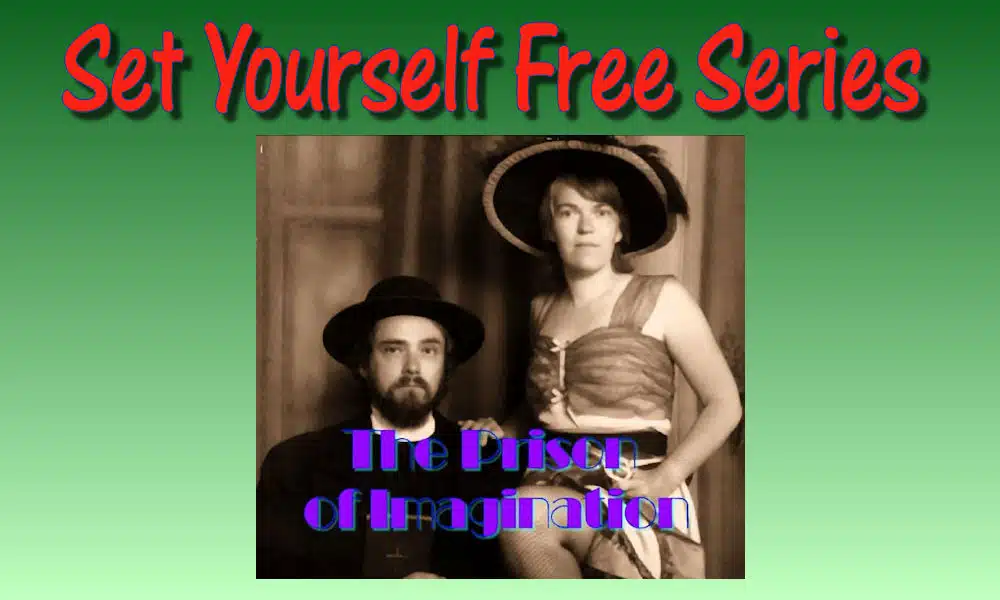- The Prison of Body Resistance — Set Yourself Free Series
- Prisons of the Spirit — Set Yourself Free Series
- The Prison of Imagination — Set Yourself Free Series
- Breaking Through Beliefs — Set Yourself Free Series
- True Intimacy — Set Yourself Free Series
- True Liberation — Set Yourself Free Series
- Learning by Letting Go — Set Yourself Free Series
- Unbinding — Set Yourself Free Series
- Dropping Manipulative Games — Set Yourself Free Series
- Passionate Engaging — Set Yourself Free Series
The Prison of Imagination — our sense of being trapped, caught, is almost always just us, trapping ourselves.
Many, many moons ago, Darbella shared a story with me.
She was describing her life, and the short version was that she imagined herself alone in a castle’s tower room. Nicely appointed, door to one side, window, 20 feet up, on the other.

She said she could see the sky through the window, and hear the sounds of people, and a parade, out the window.
Dar was comfortable, but unable to participate in what she could hear and then assume was happening outside the tower.
I read the story, got a sense of how frustrated she was, given that the story was “the story of her life.”
I asked her, “Can you go inside and imagine the room?”
Dar’s good at visualizing, so she did that easily.
I said, “Would you mind going over and checking the door?”
She did… and it was unlocked!
As are almost all the doors in our our lives.
We are prisoners of our own imagination
For me, a major “unlocked door” I needed to “let go of” was being a minister
I knew, back then, that as the years went by, I was more and more dissatisfied. I stayed, I admit with embarrassment, because I liked speaking in public, liked the adulation, and liked the money.
Three really bad reasons for doing stuff
It all “went South” back in 1996, and here I am, 28 years later, and none the worse for wear.
There was no downside (other than a bunch of people who likely are still mad at me… I’m used to that) — the things I imagined happening if I left that prison never happened.
I’m not being Pollyanna-ish about this — the clear truth is this:
Bad stuff happens to all of us, but almost always, the consequences are not as bad as we imagine. And no matter how bad it gets, there are ways “out and through.”
Sitting in the locked jail cell, concocting horror stories, on the other hand, means a relentless flow of “day after day, all the same.”
Back in my counsellor training days, the Profs taught you fallback questions — what to say if you got stuck. I seldom do, but remember the questions. I even pulled three out the other day. They are:
- do you have permission to be happier than your parents?
- do you have permission to have a better relationship than your parents?
- do you have permission to be a better parent than your parents?
and I’d add:
1) do you have permission to be more successful than your father or mother?
Odd, eh?
And not very self responsible language, I know. Maybe better: “Do you allow yourself to…”
But it is sort of like permission I give myself. I can choose to let myself exceed the standard I grew up under, and then to exceed my own standards, again and again.
- I remember, for example, that my dad was a ping pong champ. He taught me to play, and by High School I was pretty good (not by today’s standards.) I played him once, and was winning. I distinctly remember a little voice, telling me “You can’t beat your dad.” I lost 3 games straight on the last point.
- More crucially, when I decided to end my prior two marriages, in each case, one of the first calls I made was to mom and dad, to see how they would react. They’d been married 56 years when my mom died, so my piddly 2 and 8 years seemed a betrayal oƒthe standard they had set.
I knew I was thinking that way, had been making clear choices for myself for a decade, and still wanted their approval.
Knowing myself, I wouldn’t have changed anything if they’d have freaked out, but I also breathed a sigh of relief when they didn’t.
This is how nuts we all are.

There are all kinds of brakes and limitations going on, right under the surface of our consciousness. Without effort, it’s hard to see through them. So, you have to look.
They will seem like hard limits
Look for stop words — things like “always” and “never.” Or “everyone knows.” Look for how often you are craning your head around, looking for permission, for someone to blame, or wondering what others think of you and what you’re doing.
Ask yourself, “Who am I giving permission to — who gets a say about what I do, think, decide?”
You might just be surprised.
Explore how you keep yourself contained — what universals you declare to keep from having to think for yourself.
What things you want to do, try, do you declare off limits, based upon fear of failure or fear of judgement.
Is doing what someone else tells you to do, for fear of ruffling feathers, really how you want to spend your life?
That door, in your locked tower… is it even locked?


